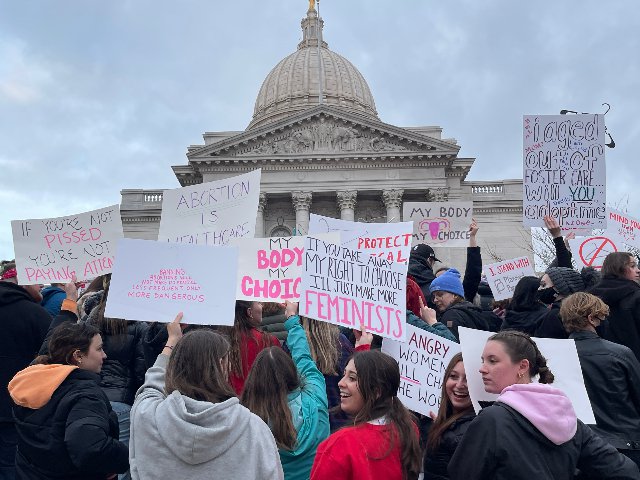Alex spent most of Tuesday scared, shocked and angry. When the UW-Madison senior heard about an evening rally at the Wisconsin state Capitol in support of reproductive rights, she knew she needed to be there.
“It’s always been debated. But I honestly never thought that access to an abortion would be so close to the edge. Maybe I should have,” says Alex, who asked that Isthmus not publish her last name. “I’m here to support all women. I’m here to support myself. I’m here to support human rights.”
Alex isn’t alone. Thousands rallied at the Capitol to hear speeches and to organize against an expected ruling from the U.S. Supreme Court that would overturn Roe v. Wade, the landmark 1973 decision that granted access to abortion. Politico reported on the leaked draft ruling late Monday night and the Supreme Court later confirmed the decision’s authenticity but said it was not final.
The expected repeal of Roe would create a new patchwork of laws on reproductive rights across the country. Wisconsin is one of nine states with legislation on the books that will make nearly all abortions illegal if the U.S. Supreme Court decision Roe v. Wade is reversed — which appears imminent given the huge news of the week.
Madison joined many other cities across the country in hosting quickly organized but well-attended protests . The crowd in Madison was young and energized, with many students demonstrating. Several people Isthmus spoke to said they expect to be protesting in the streets again in the weeks to come. After listening to speakers on the steps of the Capitol, demonstrators filled State Street while marching down to Library Mall.
“I don’t know but I’ve been told, this pro-life shit is getting old,” chanted the marching protesters. “Hey Wisconsin you can’t hide, we can see your sexist side.”
Temisan Blagogee is a second-year medical student at the UW School of Medicine and Public Health. This future doctor is concerned that the reversal of Roe v. Wade will exacerbate inequities in the health care system.
“I’m here because women’s lives are on the line. All the studies have shown that abortions don’t decrease when criminalized. They become unsafe and potentially deadly. This is a public health issue, not a political issue,” says Blagogee. “Am I surprised? Unfortunately, no. When Donald Trump was elected that’s when I realized a big shift was coming. It’s still frustrating.”
Rachel Andrie, who came to the rally with Blagogee and is also a second-year medical student, wanted to share a personal story that she says isn’t uncommon.
“When I was undergrad, I experienced a sexual assault without birth control. I almost had to consider an abortion. So this is personal to me. If this [U.S. Supreme Court] decision goes through, what are women going to do? Because there’s lots of us who never expected to be in a position where they have to make that choice,” says Andrie. “I’m considering an OBGYN [speciality] in my future career. No doctor should have to decide between breaking the law and possibly going to jail, or whether to help a patient.”
Jazmine is a 17-year-old La Follette High School student. She didn’t want to provide her last name to protect the privacy of her family.
“I’m here because I have close relatives, including my mom, who had to have an abortion. Without that right, a lot of Black women — who look like me — wouldn’t have the opportunity to control their own lives. To make their own decisions,” says Jazmine. “I can’t speak for everyone, but I think young people knew this fight was coming and we’re ready.”
The protest also attracted organizing efforts by Madison Socialist Alternative, the campaigns of more than one Democratic contender for U.S. Senate, and Planned Parenthood of Wisconsin. Elisabeth Trenta, who said she was there on her own, had a QR code ready for passersby to scan so they could get information to call Wisconsin’s U.S. Senators Tammy Baldwin and Ron Johnson to urge them to pass the Women’s Health Care Protection Act. The bill would legalize abortions nationally and supersede state laws restricting access. It passed the House of Representatives in September but was blocked by Senate Republicans in February.
“Obviously, I think it would be great if Roe v. Wade wasn’t overturned at all. But if it’s going to be overturned, then it’s even more important that access to life-saving healthcare is codified in law,” says Trenta. “I’m not giving up and it looks like the thousands of people who showed up tonight aren’t either.”


